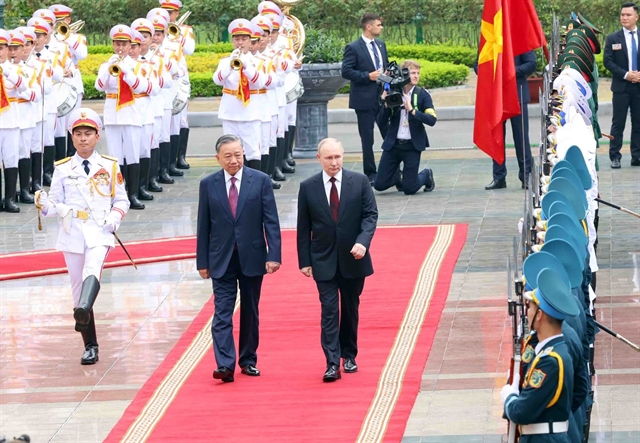Bamboo diplomacy: Hanoi welcomes Putin while trying not to break
The Russian president met with Tô Lâm, who came out on top following anti-corruption purges. The two signed a series of agreements in traditional sectors. Vietnam sees Russia and the United States (which criticised the visit) as rivals on an equal footing, but holds China in much higher regard. Experts do not expect Hanoi to take further risks in foreign policy.
Hanoi (AsiaNews) – Russian President Vladimir Putin landed in Vietnam for a two-day visit following his visit to North Korea.
Welcomed by President Tô Lâm, who has been in office for less than two months, Putin will meet with the General Secretary of the Communist Party of Vietnam, Nguyễn Phú Trọng, the country’s de facto leader, since he heads the Politburo and the Central Military Commission.
The Russian president arrived at a time of great transformation in Vietnam. An anti-corruption campaign has been underway for months, sweeping away some of the main office holders in the Communist regime, with Tô Lâm emerging as one of the top figures, potentially the next general secretary at the Communist Party congress in 2026.
Relations between Moscow and Hanoi have been friendly since the 1950s, when the Soviet Union offered its support to North Vietnam. Nguyễn Phú Trọng, like many other senior Vietnamese Communist Party officials, studied in Russia.
Since the invasion of Ukraine, Vietnam (like other countries with long-established relations with Russia) has refrained from condemning Russia’s action. Despite a certain rapprochement with the United States and the West against China, the Southeast Asian country remains Russia’s main trading partner in the region.
Still, bilateral trade is a puny US$ 3.63 billion in 2023 and US$ 1.96 billion in the first five months of 2024, compared to US$ 171 billion for China and US$ 111 billion for the United States.
Vietnam still relies on Russian-made military equipment, but after the outbreak of war in Ukraine, it halted large-scale purchases and began diversifying its sources.
The most important relationship is with Russian oil companies for exploration in the South China Sea, where Vietnam, like other countries in the region, frequently runs up against China’s (baseless) claims in the South China Sea.
Vietnam wants reassurances that ties between Russia and China will not be at its expense; for this reason, it has brushed off US criticism. In fact, on Monday, the US Embassy in Hanoi, in a statement said “no country should give Putin a platform to promote his war of aggression”.
After signing a series of agreements in "traditional" sectors such as energy, the Russian president said that the two countries share an interest in "developing a reliable security architecture" in the Asia-Pacific region, based on the non-use of force and the peaceful resolution of disputes, with no room for "closed political-military blocs".
According to experts, Vietnam sees Russia and the United States as symmetrical rivals, but holds China in greater regard, with a mixture of deference and distrust.
Case in point: US President Joe Biden travelled to Vietnam last year, invited by the head of the Communist Party, and greeted at the airport by the head of the Party's Foreign Affairs Committee, like Putin today. By contrast, Chinese President Xi Jinping was invited by the head of state and the general secretary, and was welcomed by the Prime Minister in December.
This type of approach is referred to as "bamboo diplomacy”, an expression coined in 2021 by Secretary Nguyễn Phú Trọng to describe the country’s foreign policy, which, while keeping firm roots in communism, seeks dialogue with countries that have conflictual relations.
Some believe that such an attitude, coupled with recent leadership changes within the Party – which has had the effect of encouraging officials to do less lest they get the boot – is unlikely to produce significant changes in economic or foreign policies.
Once the Russian president is gone, Daniel Kritenbrink, US Assistant Secretary of State for East Asia and the Pacific, is expected to arrive in Hanoi.
In Hanoi, they know very well that if the bamboo bends too much in any direction, it risks breaking.
12/12/2023 17:24







.png)










